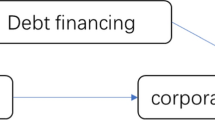Abstract
The green finance sector is key to accelerating the green transformation of economic structures and promoting green economic growth. However, understanding how to effectively combine green finance and green innovation is still in the exploratory stage. Using the implementation of the Green Credit Guidelines (hereinafter Guidelines) in 2012 as a quasi-natural experiment, we examine the causal relationship between green finance and green innovation. According to our findings, the green innovation performance of green credit-restricted industries improved significantly after the implementation of the Guidelines, although quality improvements of green innovation were not evident. This was a result of improved management efficiency and investment efficiency. Additionally, the Guidelines appear to have a more positive impact on green innovation for firms with lower levels of managerial short-termism or firms in regions with stronger environmental law enforcement. Green innovation can significantly enhance the environmental and social performance of a company.




Similar content being viewed by others
Data availability
The datasets used and/or analyzed during the current study are available from the corresponding author upon reasonable request.
References
Acemoglu D, Akcigit U, Hanley D, Kerr W (2016) Transition to clean technology. J Polit Econ 124(1):52–104
Aghion P, Bénabou R, Martin R, Roulet A (2020) Environmental preferences and technological choices: is market competition clean or dirty? National Bureau of Economic Research
Amore MD, Bennedsen M (2016) Corporate governance and green innovation. J Environ Econ Manag 75:54–72
Andersen DC (2017) Do credit constraints favor dirty production? Theory and plant-level evidence. J Environ Econ Manag 84:189–208
Asni N, Agustia D (2022) Does corporate governance induce green innovation? An emerging market evidence. Corporate Governance, ahead-of-print
Beck T, Levine R, Levkov A (2010) Big bad banks? The winners and losers from bank deregulation in the United States. J Financ 65(5):1637–1667
Berrone P, Fosfuri A, Gelabert L, Gomez-Mejia LR (2013) Necessity as the mother of ‘green’inventions: institutional pressures and environmental innovations. Strateg Manag J 34(8):891–909
Brauer MF (2013) The effects of short-term and long-term oriented managerial behavior on medium-term financial performance: longitudinal evidence from Europe. J Bus Econ Manag 14(2):386–402
Brochet F, Loumioti M, Serafeim G (2015a) Speaking of the short-term: disclosure horizon and managerial myopia. Social Science Electronic Publishing
Brochet F, Loumioti M, Serafeim G (2015b) Speaking of the short-term: disclosure horizon and managerial myopia. Rev Acc Stud 20(3):1122–1163
Caliendo M, Kopeinig S (2008) Some practical guidance for the implementation of propensity score matching. J Econ Surv 22(1):31–72
Chava S, Livdan D, Purnanandam A (2009) Do shareholder rights affect the cost of bank loans? Rev Financ Stud 22(8):2973–3004
Chen Y, Podolski EJ, Veeraraghavan M (2015) Does managerial ability facilitate corporate innovative success? J Empir Financ 34:313–326
Demerjian P, Lev B, McVay S (2012) Quantifying managerial ability: a new measure and validity tests. Manage Sci 58(7):1229–1248
Dean TJ, Brown RL (1995) Pollution regulation as a barrier to new firm entry: initial evidence and implications for future research. Acad Manag J 38(1):288–303
D’Orazio P (2022) Mapping the emergence and diffusion of climate-related financial policies: evidence from a cluster analysis on G20 countries. International Economics 169(C):135–147
Fu L, Yi Y, Wu T, Cheng R, Zhang Z (2022) Do carbon emission trading scheme policies induce green technology innovation? New evidence from provincial green patents in China. Environ Sci Pollut Res
Goetz MR (2019) Financing conditions and toxic emissions
Guan T, Zhang A, Liu L (2019) On appropriately sequencing in China’s financial opening up around the “three-in-one”. In The Fundamental Dynamic Effect on Reform and Opening in China (pp. 329–355). Brill
Hambrick DC, Mason PA (1984) Upper echelons: the organization as a reflection of its top managers. Acad Manag Rev 9(2):193–206
He L, Zhang L, Zhong Z, Wang D, Wang F (2019) Green credit, renewable energy investment and green economy development: empirical analysis based on 150 listed companies of China. J Clean Prod 208:363–372
Hirshleifer D, Thakor AV (1992) Managerial conservatism, project choice, and debt. Rev Financ Stud 5(3):437–470
Holmstrom B (1989) Agency costs and innovation. J Econ Behav Organ 12(3):305–327
Huang J-W, Li Y-H (2017) Green innovation and performance: the view of organizational capability and social reciprocity. J Bus Ethics 145(2):309–324
Kang S, Chung CY, Kim D-S (2019) The effect of institutional blockholders’ short-termism on firm innovation: evidence from the Korean market. Pac Basin Financ J 57:101188
Klassen RD, McLaughlin CP (1996) The impact of environmental management on firm performance. Manage Sci 42(8):1199–1214
Laverty KJ (1996) Economic “short-termism”: the debate, the unresolved issues, and the implications for management practice and research. Acad Manag Rev 21(3):825–860
Li F (2010) Textual analysis of corporate disclosures: a survey of the literature. Social Science Electronic Publishing, 29
Li D, Zheng M, Cao C, Chen X, Ren S, Huang M (2017) The impact of legitimacy pressure and corporate profitability on green innovation: evidence from China top 100. J Clean Prod 141:41–49
Lin W-L, Cheah J-H, Azali M, Ho JA, Yip N (2019) Does firm size matter? Evidence on the impact of the green innovation strategy on corporate financial performance in the automotive sector. J Clean Prod 229:974–988
Liu S, Xu R, Chen X (2021) Does green credit affect the green innovation performance of high-polluting and energy-intensive enterprises? Evidence from a quasi-natural experiment. Environ Sci Pollut Res 28(46):65265–65277
Liu X, Anbumozhi V (2009) Determinant factors of corporate environmental information disclosure: an empirical study of Chinese listed companies. J Clean Prod 17(6):593–600
Liu X (2022) Managerial myopia and firm green innovation: based on text analysis and machine learning. Front Psychol 13
Marginson D, McAulay L (2008) Exploring the debate on short-termism: a theoretical and empirical analysis. Strateg Manag J 29(3):273–292
Mikolov T, Sutskever I, Chen K, Corrado G, Dean J (2013) Distributed representations of words and phrases and their compositionality. Adv Neural Inf Proces Syst 26
Pan X, Cheng W, Gao Y, Balezentis T, Shen Z (2021) Is environmental regulation effective in promoting the quantity and quality of green innovation? Environ Sci Pollut Res 28(5):6232–6241
Porter ME (1995). Linde, Cvd (1995). Green and competitive: ending the stalemate. Harvard Bus Rev 73(5): 120–134
Qiu LD, Yu M (2020) Export scope, managerial efficiency, and trade liberalization: evidence from Chinese firms. J Econ Behav Organ 177:71–90
Richardson S (2006) Over-investment of free cash flow. Rev Acc Stud 11(2):159–189
Sachs JD, Woo WT, Yoshino N, Taghizadeh-Hesary F (2019) Importance of green finance for achieving sustainable development goals and energy security. In Handbook of Green Finance (pp. 3–12). Springer
Shao S, Hu Z, Cao J, Yang L, Guan D (2020) Environmental regulation and enterprise innovation: a review. Bus Strateg Environ 29(3):1465–1478
Song M, Wang S, Zhang H (2020) Could environmental regulation and R&D tax incentives affect green product innovation? J Clean Prod 258:120849
Su D, Lian L (2018) Does green credit policy affect corporate financing and investment? Evidence from publicly listed firms in pollution-intensive industries. J Financ Res 12(12):123–137
Tan X, Yan Y, Dong Y (2022) Peer effect in green credit induced green innovation: an empirical study from China’s Green Credit Guidelines. Resour Policy 76:102619
Tang M, Walsh G, Lerner D, Fitza MA, Li Q (2018) Green innovation, managerial concern and firm performance: an empirical study. Bus Strateg Environ 27(1):39–51
Tolliver C, Fujii H, Keeley AR, Managi S (2021) Green innovation and finance in Asia. Asian Econ Policy Rev 16(1):67–87
Udayasankar K (2008) Corporate social responsibility and firm size. J Bus Ethics 83(2):167–175
van Leeuwen G, Mohnen P (2017) Revisiting the Porter hypothesis: an empirical analysis of green innovation for the Netherlands. Econ Innov New Technol 26(1–2):63–77
Yang Y, Su X, Yao S (2022) Can green finance promote green innovation? The moderating effect of environmental regulation. Environ Sci Pollut Res 1–14
Yao Q, Zeng S, Sheng S, Gong S (2021) Green innovation and brand equity: moderating effects of industrial institutions. Asia Pac J Manag 38(2):573–602
Yin C, Salmador MP, Li D, Lloria MB (2022) Green entrepreneurship and SME performance: the moderating effect of firm age. Int Entrep Manag J 18(1):255–275
Yu C-H, Wu X, Zhang D, Chen S, Zhao J (2021) Demand for green finance: resolving financing constraints on green innovation in China. Energy Policy 153:112255
Funding
This work was supported by the Zhejiang Provincial Philosophy and Social Science Planning Project (22NDJC015Z; 20NDJC225YB) and the Zhejiang Provincial Soft Science Project (2022C35080; 2022C35088; 2021C35020) and the Zhejiang Provincial Education Department (Y202250353).
Author information
Authors and Affiliations
Contributions
Xiaohui Xu contributed to the study’s conception and design. Material preparation, data collection, and analysis were performed by Xiaohui Xu. The first draft of the manuscript was written by Xiaohui Xu who commented on previous versions of the manuscript. Xiaohui Xu revised the manuscript and read and approved the final manuscript.
Corresponding author
Ethics declarations
Ethics approval and consent to participate
Not applicable.
Consent for publication
Not applicable.
Competing interests
The author declares no competing interests.
Additional information
Responsible Editor: Nicholas Apergis
Publisher's note
Springer Nature remains neutral with regard to jurisdictional claims in published maps and institutional affiliations.
Rights and permissions
Springer Nature or its licensor (e.g. a society or other partner) holds exclusive rights to this article under a publishing agreement with the author(s) or other rightsholder(s); author self-archiving of the accepted manuscript version of this article is solely governed by the terms of such publishing agreement and applicable law.
About this article
Cite this article
Xu, X. Does green finance promote green innovation? Evidence from China. Environ Sci Pollut Res 30, 27948–27964 (2023). https://doi.org/10.1007/s11356-022-24106-1
Received:
Accepted:
Published:
Issue Date:
DOI: https://doi.org/10.1007/s11356-022-24106-1




